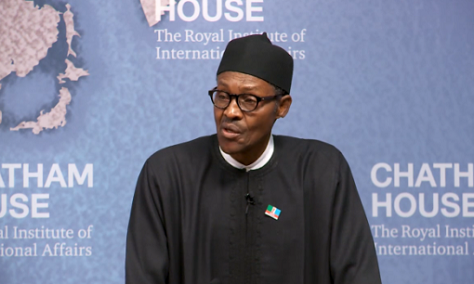Since last weekend, leading Nigerian presidential challenger Muhammadu Buhari has been in London, even though he’s waging a spirited fight in what could easily be the most contested election since the return of civilian rule in 1999.![]()
So what was he doing spending a week in the United Kingdom, over 4,200 miles away?
Buhari, the candidate of the opposition All Progressives Congress (APC), who’s waging his fourth presidential campaign since 2003, was also Nigeria’s military head of state between December 1983 and August 1985 has been in the United Kingdom, waging a charm campaign that seems largely geared at allaying fears of Western government, specifically those of the United Kingdom and the United States, that a Buhari victory in Nigeria’s delayed March 28 election would represent a backtrack for democracy in Africa’s most-populous country and its largest economy.
* * * * *
RELATED: Six weeks can’t defeat Boko Haram —
or fix Nigerian democracy
* * * * *
He appeared at the leading think tank, Chatham House, in London on Thursday.
Though it was clear that his audience was Western policymakers and not Nigerian voters, Buhari’s remarks, at least at face value, were humble, measured and thoughtful, and he committed himself to democracy, not only in Nigeria but throughout Africa, expressing hope that a flourishing, democratic Nigeria could trigger a wave of consolidated democratization throughout Africa. Buhari’s victory could end, after 16 years, the dominance of the governing People’s Democratic Party (PDP) in Nigeria.
He spoke, sometimes eloquently, about how democratic elections alone are not enough to entrench democratic traditions in Africa.
As you all know, Nigeria’s fourth republic is in its 16th year, and this election will be the fifth in a row. This is a major sign of progress for us, given that our first republic lasted three years and five months. The second republic ended after four years and two months.
And the third republic was a stillbirth.
That last bit elicited laughter from the audience, because it was Buhari who led the military coup that brought the third Nigerian republic to its end three decades ago.
But Buhari ended his remarks by addressing his own baggage, the most controversial aspect of his candidacy. As Nigeria’s military head of state in the 1980s, Buhari led the coup that deposed Nigeria’s first elected president and subsequently governed in ways that violated human rights principles:
Let me close this discussion on a personal note. I have heard and read references to me as a former dictator in many respected British newspapers, including the well-regarded Economist. Let me say, without sounding defensive, that dictatorship was military rule. Though some are less dictatorial than others, I take responsibility for whatever happened on my government watch. I cannot change to the past, but I can change the present and the future. So before you is a former military ruler and a converted democrat.
Frankly, that’s a lot more apologetic than South Korean president Park Guen-hye, who only reluctantly expressed regret for the excesses of her father, South Korea’s military dictator for nearly two decades. Indian prime minister Narendra Modi hasn’t apologized at all for more than 1,000 Muslim killed in riots that took place in Gujarat in 2002, when Modi’s state government was accused of encouraging Hindus to take vigilante action.
Though Nigeria’s sporadic military rule firmly ended in 1999, its first ‘civilian’ president, Olusegun Obasanjo, was a Nigerian army general and his administration, which ended in 2007, found many top roles for Obasanjo’s former military pals. No one today could call Buhari, three decades after his own role in toppling an elected Nigerian president, a figure who wants to restore military rule. Ironically, perhaps, Nigeria’s military brass today generally favors the incumbent, Goodluck Jonathan, and Buhari, a northern Muslim with a reputation as something of an ascetic who tried to reduce corruption in the 1980s, could upset the cozy links between Nigerian business and government.
But Western governments, which have worked closely with Jonathan since he assumed the presidency in 2010, have been wary of Buhari, questioning what his checkered past would mean in the event that he defeats Jonathan — a result that seems quite possible, according to ground reports and to polls.
There are two explanations for why Buhari, who also met quietly with former British prime minister Tony Blair (pictured above) over the weekend, would spend such a long time abroad in the heart of Nigeria’s toughest election in 16 years. Continue reading What is Nigerian candidate Buhari really doing in London?

